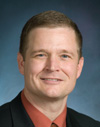
C.J. Huff JOPLIN SCHOOL DISTRICT, JOPLIN
There was no school on Monday, May 23, 2011, for students in Joplin. Most kids had the day off; but at four buildings, there literally was no school—they had been reduced to brick piles by the previous evening’s tornado. The school year effectively ended in Joplin that day, and the 2011-12 term was less than 90 days away.
C.J. Huff wasn’t going to see it arrive without every student at a desk, in a classroom—with a roof. “When I set the goal to open schools on time two days after the storm, it was more to get my team focused and to get our kids out of the rubble as quickly as possible,” the Joplin district’s superintendent recalls. “I had no idea at the time that it would become a rallying point for our entire community.”
But hitting that start date was important to everyone, he says, “because it was the first sign that we were going to be OK as a community.” And indeed, when schools opened in mid-August, “for me personally, it was the greatest day of my career. Not so much because we met our goal, but because the reuniting of our staff with our kids was so inspiring.”
A native of McCune, in southeast Kansas, Huff worked for years as a teacher and administrator in several Missouri districts before coming to Joplin. He and his wife Jennifer, have three children, and on those rare occasions he can get away on his own, he likes to hunt and fish.

Leo Drey L-A-D FOUNDATION, ST. LOUIS
Back when he was keeping office hours, Leo Drey revealed the source of his passion—and wit—with the greeting on his answering machine: “I’m out planting a forest. Leave a message, and I’ll try to get back to you before it matures.” He wasn’t entirely kidding. The St. Louis native began acquiring land in the Ozarks in 1951, aggressively tracking parcels being sold for back taxes or wrecked by clear-cutting. Then he set out to mend them. By 2006, Drey was the largest landholder in Missouri, with 160,000 acres. He formed the L-A-D Foundation, titled 90 percent of that acreage to it, and today his legacy grows, quite literally, in what’s known as Pioneer Forest. It covers parts of six counties in the Current River region. Drey’s work over the bulk of his adult life has demonstrated that single-tree selection for harvest can be cost-efficient as well as sustainable. It has also helped preserve a portion of Missouri heritage he deeply loves. “I particularly like and respect Ozarks folks in Missouri,” said the 95-year-old, who lives in St. Louis with his wife, Kay. “They have respect for the land and an independent spirit.” The Current River has always been a special place for Drey. “The forested Ozark mountains, with their clear-flowing streams, are unique,” he said. “I’ve always loved canoe floating in the Ozarks; I hope the enlightened management of Pioneer Forest will continue to inspire Ozarks residents and other Missourians” to protect the state’s assets in timbered land and waterways.

Joe Carmichael CARMICHAEL & NEAL, SPRINGFIELD
A staunch Democrat in the GOP stronghold of southern Missouri, Joe Carmichael has been outmanned for years—but never outgunned. He’s managing partner at the law firm of Carmichael & Neal, a student of political science and, for eight years, was chairman of the state Democratic Party. “So much of politics is demographics,” he muses, noting that the demographics of Springfield itself are changing as the U.S. 65 corridor through to Branson continues to grow. “It’s becoming more progressive, I think, because the people moving in here are bringing ideas and thoughts and histories with them that are different from those of the people who have grown up here”—including native son Joe Carmichael. His law practice concentration includes taxation, business planning and tran-sactions, and commercial litigation. “There are two kinds of lawyers,” he says: “Those that take down roadblocks and those that put up road-blocks. I like to think I’m somebody who takes them down. I enjoy finding solutions for people in bad circumstances. We can’t always do that as lawyers, but when it does happen, it’s very rewarding.”
He’s been Greene County party chair, a delegate to four Democratic National Conventions (1988–2000) and a member of the party’s national committee for eight years. That perspective has helped hone his views of fellow Missourians. “The state’s sobriquet, Show Me, really says a great deal about our people and our culture,” he says. He and his wife, Marie, have raised a pair of physicians—daughter Kate, in Liberty, and son Joe, on the surgical faculty at the University of California–Irvine.

Eliot Battle COLUMBIA PUBLIC SCHOOLS
“Strength,” says Eliot Battle. “It isn’t easy to categorize Missourians. One trait, however, is strength. Most Missourians are truly strong people.” Battle knows a little bit about being strong. A native of Alabama, he came to Columbia in 1956—two years after Brown v. Board of Education, but a full four years before the city’s schools would integrate. He and his late wife, Muriel—a career teacher, principal and associate superintendent—became pillars of the local civil-rights movement. So much so that next year, Columbia will honor her legacy by christening the new Muriel Battle High School. “I feel so honored,” by that, Battle says. “So very proud.” Throughout his own career as a guidance counselor for Columbia’s schools, Battle worked to pass along to students the kinds of values he inherited from his parents back in Mobile, Ala.: “A strong personal determination to achieve,” he says, and “personal and academic pride. I have special pride in my family and the determination of my ancestry. My parents and grandparents were achievers who set a pattern for those in my generation.”
Both of his parents were college graduates, and they raised five children who also included two physicians, a social worker and a dietician. “We were all results of high expectations,” Battle says.